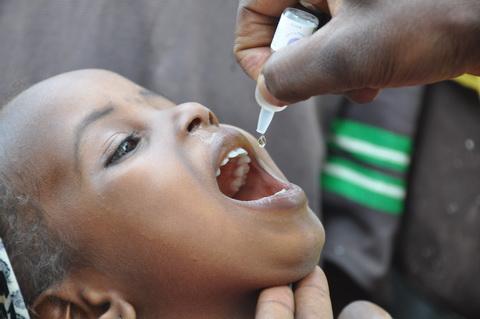

Kazeem Biriowo – Abuja
Immunisation is aimed at the prevention of infectious diseases. In Nigeria, the National Programme on Immunisation (NPI) suffers recurrent setbacks due to many factors including cultural and religious beliefs.
One of the major reasons Nigeria is committed to the goals of the Global Vaccine Action Plan, (GVAP), was not only to ensure that at least 90 percent of children under the age of 5 are immunised with all the relevant and available vaccines for children but to put to an end or reduce to the barest minimum child killer diseases.
However, with the slow progress being made in immunisation coverage, Nigeria still falls short of the goal it set with only 57 percent of children immunised in the last five years.

This is according to the 2021 Multiple Indicator Cluster Survey, MICS, and the National Immunisation Coverage Survey, NICS, jointly released by the Nigerian Government, the United Nations Children’s Fund, UNICEF, with other partners.
In the same vein, findings by Tribune showed that many mothers and caregivers still have reservations about immunisation, leaving Nigeria with only 36 percent of children aged between 12 and 23 months receiving all recommended vaccines, according to the 2021 MICS.
Although, the benefits of vaccines are fully realised when children receive all recommended vaccine doses promptly, many of these children receive incomplete doses due to cultural beliefs of their parents.

While interacting with some parents in Abuja suburbs, it was gathered their cultural beliefs according to them is against routine immunisation which findings revealed that it is mere myth and fear factors of eventually losing their children.

In Idu, Eunice Shokwelo, a 37-year-old mother of three said it took a lot of pressure and persuasion from some health workers and Non-government organisations personnel to take her first child for routine immunization as she said her husband’s family does not believe in using injection or orthodox medicine to treat any diseases
Also, a 40-year-old Mariam Adamu Magashi in Jiwa, said she noticed that her son was restless when he was given immunisation injection but she did not specify the type of immunization given.
She said because of what she noticed that the injection has a lot of side effects on her child, she has not taken any of her children for immunization as she resulted to traditional treatment methods in bringing them up.
Many children in Nigeria have either received one or two immunisations and some have not received any at all due to their parent’s cultural beliefs or practices
Currently, immunisation coverage in Nigeria is below GVAP goals, thereby putting millions of children at risk of vaccine-preventable diseases.
Another problem and challenge facing immunization programmes in Nigeria is the rejection of selected vaccines or vaccination by parents or religious bodies, especially in the northern part of this country.
The reasons for such rejection are outlined as fear and confusion in which many decision-makers and caregivers reject routine immunisation due to rumour, incorrect information, and fear.
Attempts to increase coverage must include awareness of people’s attitudes and the influence of these on behaviour.
Fears regarding routine immunisation are expressed in many parts of Nigeria. Fathers of partially immunised children in Muslim rural communities in Lagos State see hidden motives linked with attempts by non-governmental organisations (NGOs) sponsored by unknown enemies in developed countries to reduce the local population and increase mortality rates among Nigerians.
Belief in a secret immunisation agenda is prevalent in Jigawa, Kano and Yobe States, where many believe activities are fuelled by Western countries determined to impose population control on local Muslim communities.
Similarly, low confidence and lack of trust Lack of confidence and trust in routine immunization as effective health intervention appear to be relatively common in many parts of Nigeria.
A 2003 study in Kano State found that 9.2% of respondents (mothers aged 15–49) evinced ‘no faith in immunization’, while 6.7% expressed ‘fear of side effects’.
For many, immunization is seen to provide at best only partial immunity, e.g. in Kano and Enugu. The widespread misconception that immunization can prevent all childhood illnesses reduces trust because when, as it must, immunization fails to give such protection, faith is lost in immunization as an intervention, for any and all diseases.
Also, shortage of vaccines and immunization supplies is also a problem fueling zero doses. Under the NPI, the first mandate is to “support the states and local governments in their immunization programmes by supplying vaccines, needles and syringes, cold chain equipment and other things and logistics as may be required for those programmes”.
However, the supply of vaccines has always been problematic for Nigeria, primarily because funds were not sufficient and were not released on time. For example in 2001 the whole amount was approved but only 61% was released, the late release of funds meant that vaccines had to be bought on the spot market at inflated prices. In 2002 no funds were released and by March 2003 the funding cycle had only reached the stage of getting the budget approved.
NPI did not supply any syringes for Rubella infection in 2005, and the only safety boxes that have been supplied are the limited quantities given by donors for SIAs.
Following an assessment in 2003, it was decided that UNICEF would supply vaccines in future. In the last quarter of 2003, UNICEF began supplying vaccines through a procurement services agreement, and this arrangement continues to date.
However, it has not solved the problem of vaccine shortages. For example, cerebrospinal meningitis (CSM) vaccine was not supplied in time to allow CSM immunization to take place before the cerebrospinal meningitis season, and some states had to buy their own stocks of CSM using state funds. Measles vaccine also arrived too late to limit the effects of a measles outbreak in the north, and an insufficient quantity of measles vaccine was supplied to Abia.
Another is the cost-saving benefit of immunization from a lower incidence of disease and less frequent visits to the hospital. In 2004, parents in both Lagos and Enugu stated that immunization reduces mortality and morbidity, helps to minimise the anxiety associated with rearing children, and helps to maximise use of time and money.
Despite decades of progress increasing access to immunisation in lower-income countries, at least 12.4 million children still go without basic, routine vaccines every year. Gavi, the Vaccine Alliance is now focusing on reaching these zero-dose children.
Twenty years ago, the global effort to ensure every child has access to vaccines was stuck in a rut. Since 1990 immunisation coverage in lower-income countries had started to stagnate and had even declined, and the poorest countries had to wait an average of seven years after the richest before getting access to new vaccines.
Ultimately, it was the children left unprotected against deadly diseases like measles, polio and pneumonia that suffered the consequences.
Nearly 50% of zero-dose children live in three key geographic contexts: urban areas, remote communities and populations in conflict settings.
Two decades later Nigeria has a lot to celebrate. Ten years of decline have turned into twenty years of growth. In lower-income countries, 78% of children received routine vaccines in 2020, despite the impact of the COVID-19 pandemic, up from 59% in 2000, and more than 500 new vaccine programmes have been introduced and scaled up. The number of children dying from vaccine-preventable diseases in these countries has dropped by 70%. Millions more children are now growing up protected.
One of the key factors in this extraordinary progress was the creation of Gavi, the Vaccine Alliance. Created in 2000 and bringing together a range of organisations working to improve access to immunisation in lower-income countries, from governments and UN agencies to vaccine industry and civil society organisations, the Vaccine Alliance now helps to immunise almost half the world’s children.
However, despite this progress, millions of children are still being left behind. In 2020, 12.4 million of the 72.5 million children that Gavi aims to reach in lower-income countries do not receive a single vaccine shot, leaving them vulnerable to some of the world’s deadliest diseases. Although only one in eight children in Gavi-supported countries do not receive any vaccines, zero-dose children account for nearly half of all vaccine-preventable deaths.
Gavi is now launching a global movement to bring an end to this inequity, making reaching zero-dose children – defined as children who don’t receive a single dose of diphtheria, tetanus and pertussis-containing vaccine – with immunisation its key priority for the next five years. The goal: to reduce the number of zero-dose children by 25% by 2025, and by 50% by 2030, which will also mark the closing of the Sustainable Development Goals.
Reaching these children means reaching the missed communities they are a part of. These unprotected communities are not only potential epicentres of disease outbreaks, they are also often deprived of other basic services and suffer from entrenched gender inequality.
Two-thirds of zero-dose children live in households surviving on less than US$ 1.90 per day – the international poverty line.
Their mothers are twice as likely to miss out on antenatal care or skilled birth attendance. The homes they live in are less likely to have access to clean water or sanitation. A lack of immunisation is just one of a range of problems.
This means that collaboration across governments, international agencies and civil society could bring benefits far beyond immunisation alone. By working together, we have a chance to leverage all our strengths to reach these communities with everything they need for a healthy, successful life – from nutrition and education to clean water to immunisation.
A close source in National Primary Health Care Development Agency(NPHCDA) who pleaded anonymity explained that routine immunisation was largely affected by the COVID-19 as the Federal Government has to introduced lockdown to curtail the spread of the pandemic
He also said effort to progress on polio immunisation was brought to a halt but the Agency found it way to maintain polio-free during the lockdown.
He maintained that cultural and religious beliefs is part of the problem as people have their reservations about the vaccine and it is a global phenomenon not peculiar to Nigeria alone.
“The COVID-19 pandemic is making things worse. With immunisation, it threatens to unravel two decades of progress. COVID-19 also make the challenge of reaching these zero-dose children even harder, as fiscal space contracts, already-limited health system capacity is diverted to COVID-19, populations move and trust in health authorities, as well as demand for vaccines, is impacted. Reaching the communities that these children are part of is more urgent and more important than ever”.
“However, the pandemic also provides opportunities. Governments are now working hard to stamp out COVID-19 wherever it’s circulating, meaning many of the missed communities in which zero-dose children live will be forming new contact points with the health system,” he added.
Findings by the MICS report showed that there are gaps in routine immunisation in Nigeria. It also shows that 64 percent of children aged 12-23 months did not receive all routine immunisations, 46 percent did receive but not all doses, 18 percent did not receive any one, and 30 percent thought the child was fully immunised.
Other reasons found by the survey showed that 51 percent lack knowledge or information, while 7 percent complained that the immunisation site was too far and 19 percent was due to service delivery issues and 11 percent reported that mothers or caregivers too were busy, 24 percent lack of time or other family issues, 11 percent had fear of side reactions and 26 percent due to mistrust or fears.
According to the report, a fully vaccinated child must have received all 1YL antigens including BCG, OPV0, HepB0, OPV1-3, IPV, Penta1-3, PCV1-3, YF, Meningitis A & MCV1
Children are significantly less likely to have received 3 doses of pentavalent vaccine if they are from poor families or rural families or if the child’s mother is younger than 25 years of age or has a low level of education,” the report revealed.
In the NICS 2021 survey, only 56 percent of children showed a child health card and the availability of child health cards varied across states, with a high of 98 percent in Ebonyi and a low of 16 percent in Sokoto. States with low immunisation coverage also had low card availability. Child health cards are important health records critical for evaluating immunisation status.
It also found that in 3 of 6 zones, there are significant differences in zero dose prevalence between urban and rural households, with rural children more likely to be zero doses.
In 4 of 6 zones, there are significant differences across one or more categories of maternal education, with less educated mothers likely to have zero-dose children. In 5 of 6 zones, there are significant differences between the poorest and richest wealth quintiles, with poorer households more likely to have zero dose children.”
According to the Chief of Monitoring for Results (M4R), UNICEF, Claes Johanson said although, the 2021 immunisation report showed a little improvement from 44 percent and now 57 percent, has a huge impact on child mortality. He said women’s education has a huge impact on immunisation.
Johanson also disclosed that the smallest proportions of children who did not receive any vaccinations are found in Enugu with 1 percent, Ebonyi 0 percent and Sokoto with 51 with r cent said the benefits of vaccines are fully realised when children receive all recommended vaccine doses promptly.
“Action should be a priority for the Nigerian government. while there was a little progress, there was room for improvement,” he added.
READ ALSO FROM NIGERIAN TRIBUNE








